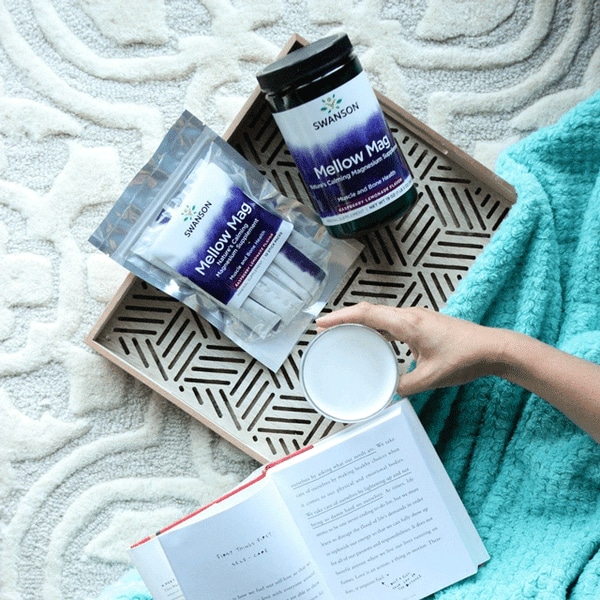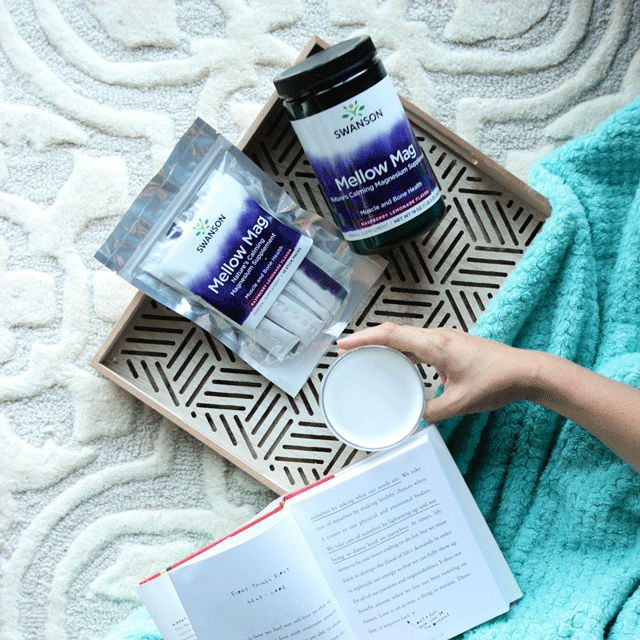What is the Best Magnesium Supplement Form for You?
What is the Best Magnesium Supplement Form for You?
Researchers estimate that 2/3 of the people in developed countries, and at least half of all Americans, don’t meet their daily needs for magnesium.1,2 That may largely be due to our diets, but our soil is also suffering from magnesium depletion, which leads to magnesium deficiencies in plants, including food crops that were previously our richest dietary sources of magnesium.2
Why does your magnesium intake matter? Magnesium is an essential mineral that our bodies need for more than 300 enzymatic reactions, and low magnesium intake has been linked to a broad range of health concerns.1 It’s essential for bone development and maintenance, muscle and nerve function, cardiovascular health and much more.3 Magnesium is also a great way to support relaxation and help defend against stress.
If you don’t get enough magnesium in your diet, you may think the answer is simple—just take a supplement, right? But there are many types of magnesium supplements, and the body absorbs each differently. So, which magnesium supplement should you take? What is the best form of magnesium for you? Let’s take a closer look at the most common magnesium supplement types available.
Magnesium Citrate
Magnesium citrate is a magnesium citric-acid complex that is widely available and versatile. It has better bioavailability than magnesium oxide, and this popular magnesium supplement is widely recommended by doctors and health professionals.4
Try it in Swanson Ultra Magnesium Citrate - Super Strength or Swanson Pure Magnesium Citrate Powder
Add some 100% Pure Magnesium Citrate Powder to your favorite drink. It’s a great option for the budget-conscious!
Magnesium Oxide and Hydroxide
Magnesium oxide and magnesium hydroxide are similar in structure and function and are both common ingredients in over-the-counter digestive tonics. Both magnesium hydroxide and magnesium oxide can have a mild laxative effect.5
These forms of magnesium generally cost less than other types of magnesium but have lower bioavailability.6 As a result, magnesium oxide and magnesium hydroxide supplements may contain as much as 60% more magnesium than other types of magnesium supplements to help make up for the lower bioavailability.6
As a general rule, loose stools from magnesium supplementation are a sign that your body isn’t fully absorbing the magnesium or that you’re taking too much magnesium at once. If you want to avoid potential laxative effects of magnesium, it may help to divide your intake into two or more smaller doses taken at different times of the day. Try magnesium oxide in Swanson Premium Magnesium.
Magnesium Chloride
Magnesium chloride is also a popular type of magnesium, but it usually isn’t taken internally. Magnesium chloride is commonly found in seawater and is believed to have high bioavailability.5-6a Magnesium chloride is available in flakes that can be added to bathwater or a foot soak, as well as in magnesium oil. This is a great option for people who have trouble taking magnesium orally, or for those who simply prefer to get their magnesium in topical form.
Magnesium Oil
Magnesium oils are gaining popularity as a convenient way to supplement magnesium intake. Quality magnesium oils are made with magnesium chloride and water, creating a super-saturated brine. This non-greasy mineral brine soaks easily into skin without leaving an unpleasant residue. Magnesium oil is typically available in a spray bottle, so you can simply spritz it on after a bath or shower. As a bonus, it helps moisturize your skin!
Magnesium Sulfate
You’ve probably heard of this type of magnesium before, but by a different name. If you’ve heard of Epsom salt—that’s magnesium sulfate! It’s very similar in appearance and usage to magnesium chloride. Simply dissolve a cup or two of Epsom salt in a warm bath and soak.
Bioavailability is lower with magnesium sulfate than with magnesium chloride. But that just means more bath time, right? Magnesium sulfate also provides sulfur, which may help soothe tired muscles. That makes Epsom salt popular among athletes looking to pamper sore or tired muscles from exercising.
Magnesium Carbonate
Magnesium carbonate is a naturally occurring form of magnesium. In nature, it occurs as dolomite or magnesite and is ground into a fine powder for use in supplements. Because of its fine texture when ground, along with its superior mixability and solubility in water, magnesium carbonate is often used in calming magnesium powder drinks like Mellow Mag, our naturally-flavored, replenishing magnesium drink mix that’s perfect for helping you unwind at the end of a long day.
Magnesium Chelates
Chelated mineral supplements, including magnesium chelates, are minerals that are bound to amino acid proteins to help make them easier for your body to absorb.7 There are many different types of magnesium chelates featuring various amino acids that provide additional benefits.
Magnesium amino acid chelates include:
- Magnesium Glycinate – Magnesium bound with glycine, provides optimum bioavailability8
- Magnesium Lysinate – Magnesium bound with lysine, helps pamper skin with amino acids9
- Magnesium Orotate – Magnesium bound with orotic acid, supports heart health10
- Magnesium Taurate – Magnesium bound with taurine, supports heart health while promoting calmness11
- Magnesium Aspartate – Magnesium bound with aspartic acid, helps fight fatigue and promotes cellular energy12
- Magnesium L-Threonate – Magnesium bound with threonic acid, promotes mental sharpness and cognitive health12
- Magnesium Malate – Magnesium bound with malic acid, supports energy production12
Chelated magnesium supplements may cost a little more because of the complex processes required to make them. However, since the body is very good at absorbing amino acids, magnesium chelates have higher bioavailability, making magnesium chelates a great option for boosting your body’s magnesium levels.
The Best Type of Magnesium for You
There are many types and forms of magnesium supplements, and they differ both in their benefits and bioavailability. Some supplements, like magnesium chelates, have additional benefits due to the amino acids that accompany them. The best magnesium supplement for you will depend on the benefits you seek. If you want to replenish magnesium levels while giving your heart health some extra support, try magnesium taurate or magnesium orotate. If you are looking for optimal bioavailability, a magnesium chelate like Swanson Albion Magnesium Glycinate is a great choice. And if you want the relaxing, mind- and body-soothing benefits of magnesium in a delicious drink try our favorite—Mellow Mag in either raspberry lemonade or orange flavor. Each serving provides 330 mg of magnesium to assist in the absorption of calcium by the body to promote strong bones.
Be sure to sign up for Swanson Health emails to be the first to know about new articles and special promotions.

About Lindsey Toth, MS, RD
Lindsey is a nationally-recognized registered dietitian and nutritionist with a soft spot for pie. She empowers people to take charge of their health by finding the balance between the pleasure and nourishment in food. Her philosophy is that you should take care of your body because it’s the only permanent home you have. It’s what inspired her to pursue a career in nutrition.
*These statements have not been evaluated by the Food and Drug Administration. These products are not intended to diagnose, treat, cure, or prevent any disease.
Sources
1. Magnesium Deficiency. Nutrition Today. Read source
2. Magnesium in Plants. The Crop Journal. Read source
3. Magnesium Fact Sheet for Health Professionals. National Institutes of Health. Read source
4. Magnesium Bioavailability. Journal of the American College of Nutrition. Read source
5. Magnesium Oxide. Nutrients. Read source
6. Bioavailability of US Commercial Magnesium Preparations. PubMed. Read source
7. Supplements with Amino Acid Chelated Minerals. Consumer Lab. Read source
8. Magnesium Glycinate. Medical News Today. Read source
9. Lysine. WebMD. Read source
10. Magnesium Orotate. Consumer Lab. Read source
11. Taurine. WebMD. Read source
12. Magnesium Supplements. Dr. Steve Lin. Read source




